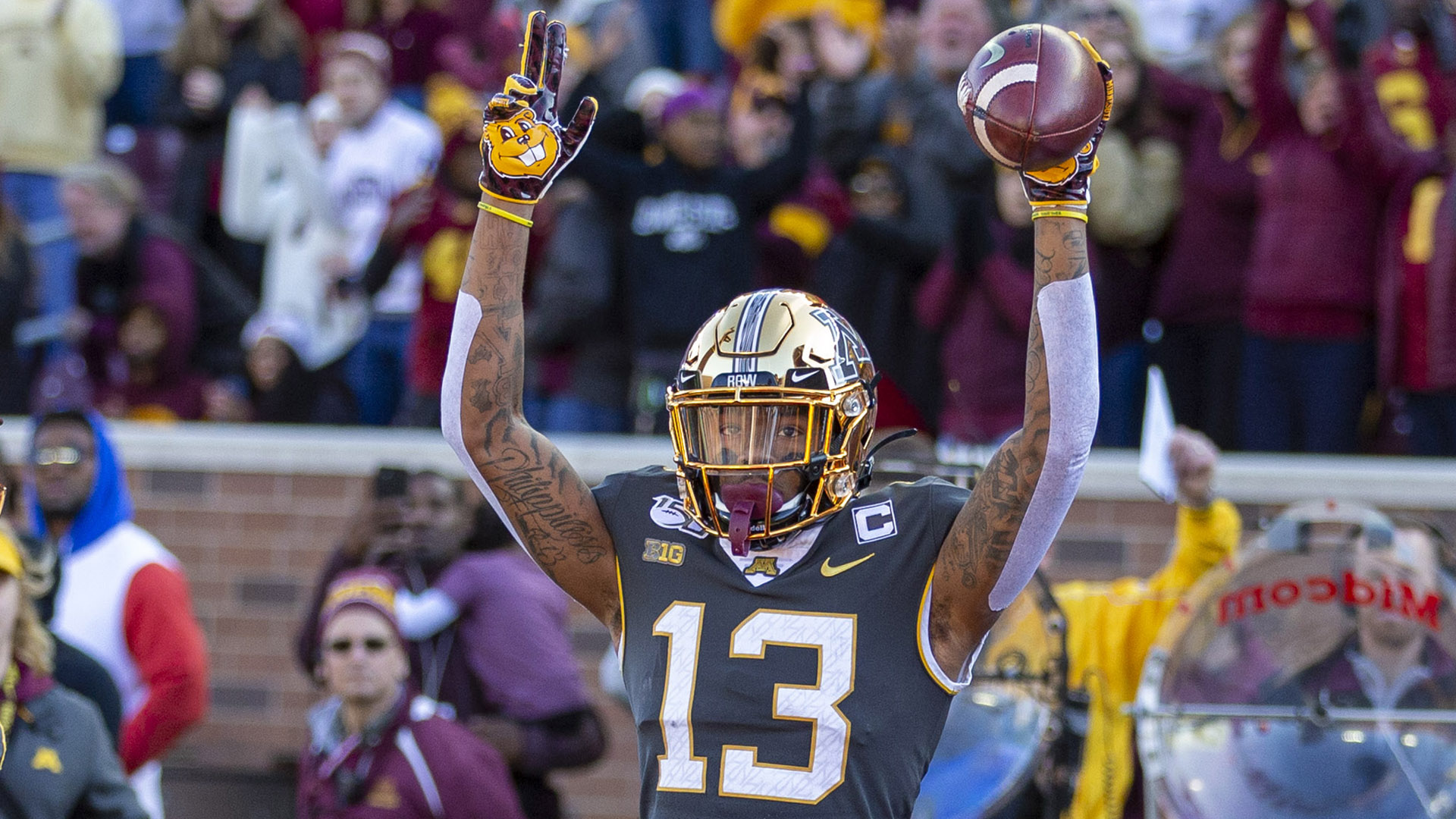Ad Disclosure

NCAA should reinstate eligibility for players who opted out — even if they signed with an agent
By Phil Ervin
Published:
When Minnesota quarterback Tanner Morgan dialed up Rashod Bateman on Sunday, it was merely to check up on a good friend. But the Gophers receiver who became the first Big Ten player to opt out of a coronavirus-derailed 2020 season immediately started in on his prospects for an unlikely return.
“I thought he was joking,” Morgan said.
But the 2019 B1G receiver of the year is dead serious.
After declaring for the 2021 NFL Draft and hiring Twin Cities agent Blake Baratz to represent him, Bateman’s career seemed all but over in early August. Yet here he is, re-enrolled in classes and practicing with Minnesota while its compliance office works with the NCAA and conference to get him reinstated.
It’s not a secret: COVID-19 has further exposed the NCAA’s toothlessness when it comes to the FBS. Other than uprooting the recruiting calendar and offering “guidance” to member institutions on how to keep players safe, the NCAA has been mostly laissez-faire regarding the pandemic.
Now it has a chance to make an actual difference.
Bateman isn’t the only B1G player to plan on forgoing the season, only to see it re-instituted with enhanced medical protocols. There are extenuating circumstances, and then there’s a global health crisis.
Which is why the NCAA should, as Herman Boone said in “Remember the Titans” when it was released two decades ago, “let ’em play!”
To judge otherwise would represent the NCAA’s latest inconsistency — did we spell hypocrisy right? — when it comes to eligibility.
Just look at the language in the organization’s academic hardship waivers:
To qualify for such a waiver, institutions must document the mitigating circumstances that caused the deficiency. A common circumstance is a student-athlete facing a serious medical issue or other personal hardship.
This isn’t specifically an academic issue. But serious medical issues and personal hardships might be the defining phrases of 2020. And well before we’d ever heard of COVID-19, dozens of athletes have been given immediate eligibility upon transferring to a different school if personal hardship rendered it appropriate in the NCAA’s eyes.
Bateman’s not alone. According to Sports Illustrated, 4 other B1G players opted out and signed with agents: Michigan tackle Jalen Mayfield, Penn State linebacker Micah Parsons, Northwestern tackle Rashawn Slater and Michigan cornerback Ambry Thomas. Slater reportedly is not returning. Of the 21 conference players to opt out, 8 have declared for the NFL draft.
Bateman’s case is interesting because he opted out Aug. 4 — a week before the B1G postponed fall sports till the spring. But now that the conference has reversed course, he and potentially others want back in.
“He was literally my first call” when the B1G announced its fall plans, P.J. Fleck said of Bateman, who some projected as the top receiver heading into the 2021 draft. “All I did was ask him, ‘if you ever want to come back, we’d love to have you.’
“Rashod initially opted out for all the right reasons: for health concerns, period. … There were too many unanswered questions down the road, just too many unknowns for people to be able to make those decisions. So they made decisions as well as everybody else in the country. But as the season was able to come back and new protocols were put in place and student-athletes feel like it’s safe to come back, that’s when he decided that maybe he would like to be able to do that.”
Why shouldn’t he be able to?
Daily testing and increased knowledge about long-term effects — the very factors that led the B1G to return to playing in the fall — weren’t in place when Bateman made his decision. Others opted out after facing the near-impossible prospects of playing a spring season while preparing for the draft.
That’s no longer a choice they have to make.
“The medical advice changes,” said Northwestern President Morton Schapiro when the B1G’s new fall plans were announced. “The facts changed and our minds changed.”
Hopefully NCAA President Mark Emmert is listening.
Could players the caliber of Bateman or, say, Purdue wideout Rondale Moore — who announced his return Thursday — come back and hurt their draft stock this fall? Absolutely. But that’s a chance they should be able to take.
Like it or not, the place of the student-athlete in major college athletics is shifting. The NCAA acknowledged as much when it proposed Name, Image and Likeness legislation that allows players to profit off endorsements earlier this year.
So why hang on to the archaic clause of “he signed with an agent, therefore his amateurism is forfeit” line of thinking? Furthermore, none of these players have inked professional contracts yet. They may have technically signed some of their future earnings over to their agents, but in the spirit of the law, they’re still amateurs.
There is the question of precedent, of course, but this would be a one-time special case due to the circumstances. The NCAA handles things on a case-by-case basis all the time, and this should be no different.
“It wasn’t just ‘is the season coming back?'” Fleck said in regards to Bateman’s situation. “It was ‘the season’s coming back with what protocols? What guidelines? Where’s the rapid testing?’ All of those things, and those questions were answered for probably student-athletes all over the country at different schools.”
A lot of tough questions remain. Allowing players like Bateman to participate this fall isn’t one of them.
Veteran sports writer Phil Ervin brings his expertise on Minnesota and B1G football to Saturday Tradition. Follow him on Twitter @PhilErvin.